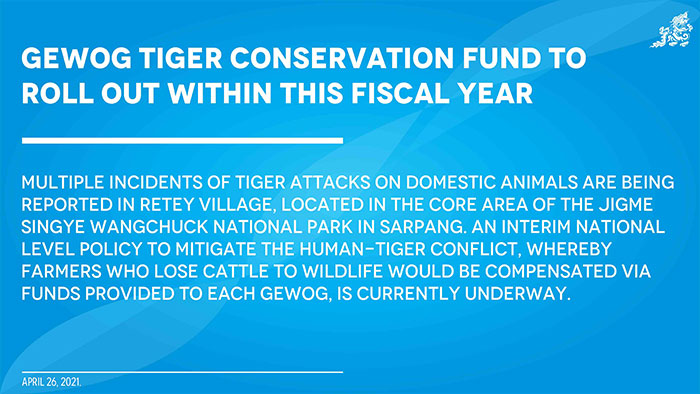
Cattle depredation on the rise in Retey, Jigmecholing
Nima | Gelephu
Located in the foothills of the mighty Black Mountain (Jowo Durshing), Retey village of Jigmecholing village in Sarpang, falls in the core area of Jigme Singye Wangchuck National Park.
With increasing cases of tiger attack on domestic animals, farmers said they pay a heavy price for living in a protected area.
A villager, Sangay Tenzin, said he lost about 13 cattle to the wild cats in the last two years. “I have written to Bhutan Tiger Center in Gelephu and the park management in Tsangkha, Trongsa.”
Farmers allege there were no proper assessments of cases and no sustainable solutions to help farmers living in the protected area sustain their livelihood.
Sangay Tenzin said that there was a need to develop a solution and assess the situation of farmers in protected areas. “We lose our livestock and agriculture produce to wildlife.”
There are more than 200 households in Gongduegang chiwog in Jigmecholing. Almost all the households depend on livestock and agriculture for living.
Farmers said Retey is most affected.
Forest beat office in Jigmecholing recorded five cases of cattle depredation in March and April this year.
Forest officials say the entire livestock depredation occurred in places more than two hours walk away from the village.
They said the village falls under the route followed by the tiger.” The livestock depredation cases would reduce if farmers herd the cattle.
The forest range official, Sangay Wangchuk, said farmers leave their cattle to graze freely. “They know about the attack only when the cattle don’t return to the shed on their own.”
He said farmers have a large number of cattle and it would be better to have a herder looking after the animals.
The attack on livestock by the tiger was discussed repeatedly in gewog tshogdu but without any concrete solutions.
Farmer said villagers who lost livestock to tigers were compensated in the past but not any more.
The compensation support was based availability of fund that were mostly depended on donors, according to the farmers and foresters.
There is no compensation or initiative that could involve farmers and the community in wildlife conservation and protection to make them aware of the endangered species today.
A forest official said it was important to have an initiative to encourage people’s participation in conservation.
“Awareness is carried out. There are strict monitoring and implementation of rules and regulations,” Sangay Wangchuk said.
The park management office falls under a low-risk area in Trongsa and the cases related to wildlife and the park are currently taken care of by Forest divisional office in Sarpang since the demarcation of high and low risk areas.
A forester said it was difficult to establish the cases as tiger attacks. “We could see only bones and some internal organs when we go to attend the case.”
An official from Bhutan Tiger Center in Gelephu said that the human-tiger conflict in Retey area and many other gewogs in Trongsa and Zhemgang are on the rise.
Head of Bhutan Tiger Center, Tshering Tempa (PhD), said the ministry and the department recognizes this as an immediate threat that needs to be addressed.
The ministry is working on the national level policy to mitigate the human-tiger conflict, and they are initiating gewog tiger conservation as an interim measure to mitigate the problem, where each gewog would be given Nu 1 million fund and also collect a minimum premium from the farmers.
“Farmers losing the cattle to the wildlife would be paid some amount under this initiative,” Tshering Tempa said. “We have started consultation with some communities but this couldn’t be done in the southern dzongkhags because of the pandemic.”
He said farmers are expected to assure that they have someone looking after the cattle once the conservation fund at the gewog level comes into effect.
The fund is expected to roll out within this fiscal year.
There are many other programmes for the communities living within protected areas such as providing high-yielding cattle, eco-tourism products, and intensified livestock rearing practices that could apply to Retey community too.
“Tiger is a national pride for Bhutan. We are known to be one of the champions in conservation. There are only over 4,000 tigers in the world. Losing one is a big loss,” Tshering Tempa said.

